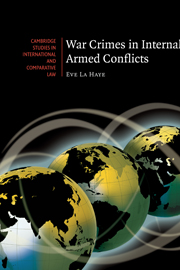Book contents
- Frontmatter
- Contents
- Acknowledgements
- List of abbreviations and acronyms
- Introduction
- 1 Towards a workable definition of internal armed conflicts
- 2 The laws of war applicable in internal armed conflicts
- 3 The regime of war crimes
- 4 Individual criminal responsibility for war crimes committed in internal armed conflicts
- 5 National prosecutions of war criminals and internal armed conflicts
- 6 International prosecutions of war criminals and internal armed conflicts
- Concluding remarks
- Select bibliography
- Index
3 - The regime of war crimes
Published online by Cambridge University Press: 27 July 2009
- Frontmatter
- Contents
- Acknowledgements
- List of abbreviations and acronyms
- Introduction
- 1 Towards a workable definition of internal armed conflicts
- 2 The laws of war applicable in internal armed conflicts
- 3 The regime of war crimes
- 4 Individual criminal responsibility for war crimes committed in internal armed conflicts
- 5 National prosecutions of war criminals and internal armed conflicts
- 6 International prosecutions of war criminals and internal armed conflicts
- Concluding remarks
- Select bibliography
- Index
Summary
A classical definition of war crimes was given by Manfred Lachs in 1945:
A war crime is any act of violence qualified as crime, committed during and in connection with a war under specially favourable conditions, created by the war and facilitating its commission, the act being directed against the other belligerent state, its interests, or its citizens, against a neutral state, its interest, its citizens as well as against stateless civilians, unless it is justified under the law of warfare.
The punishment of individuals for war crimes is as old as the rules regulating warfare. Sanctions for violating the laws and customs of war have been an integral part of the laws of warfare and probably an essential trigger to assure some compliance with this body of law by soldiers. Prosecutions could naturally be undertaken by the enemy into whose hands the alleged offender had fallen, or alternatively by the military authorities of the alleged offender. The principle of individual criminal responsibility slowly found its way into international instruments codifying the laws and customs of war. In the twentieth century, an essential ingredient of the regime of war crimes was added with the creation of international tribunals able to prosecute war criminals for what had become international crimes. This chapter will give a brief historical overview of the regime of war crimes as well as a study of the regime of war crimes regulating international armed conflicts.
- Type
- Chapter
- Information
- War Crimes in Internal Armed Conflicts , pp. 104 - 130Publisher: Cambridge University PressPrint publication year: 2008



